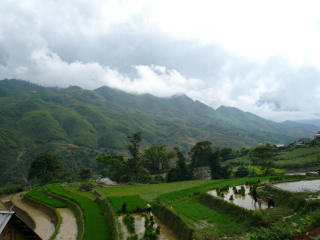
Minorities in the Southeast Asian Massif Research Lab, Canada
The Minorities in the Southeast Asian Massif research laboratory brings together students working with Professors Sarah Turner (Geography, McGill) and Jean Michaud (Anthropology, Université Laval, Québec City) on a number of cross-disciplinary research projects. Lab members investigate a broad array of topics that generally relate to better understanding the livelihoods of upland ethnic minorities in the Southeast Asian Massif, encompassing southwest China, Vietnam, Laos, and Thailand.

Yunnan-Vietnam Border Dynamics (2009-)
Members of the lab and collaborators are researching cross-border trade and livelihood dynamics across the southwest Yunnan-northern Vietnam border. We are currently focusing on the Vietnam provinces of Lào Cai, Lai Châu, Điện Biên, and Hà Giang, and the Yunnan prefectures of Honghe and Wenshan. The team aims to better understand how transnational ethnic minority residents achieve cross-border trading livelihoods, while negotiating the political implications of an international borderline. Drawing on conceptual literature from livelihood studies, marketplace investigations, commodity flow analyses, and borderland debates, we focus on the importance of the place-based knowledge of border residents, recognizing that their local wisdom and experiences often reflect very down-to-earth ways of negotiating borders and state policies.

Vietnam Upland Livelihood Dynamics and Agrarian Change (2002-)
Some lab members concentrate on highland livelihoods with regards to agrarian change and market integration. In Vietnam, we are trying to better comprehend the activities, interactions and power relations that occur between upland minorities such as Hmong and Yao, and Kinh (lowland Vietnamese). Our work is currently situated in a number of different rural locations in the north-western upland provinces of Lào Cai and Hà Giang, located on the border with China. Different foci include: hybrid rice and maize state subsidy programs and upland residents’ reactions and resistance, state marketplace development policies and local trader coping mechanisms, food security and impacts of extreme weather events. These themes provide a broad understanding of how upland minorities have coped over time in making a living by adapting their livelihood patterns during what are often highly antagonistic political circumstances, from imperial rule, through colonial and socialist rule, and finally to post-socialist market conditions today.

Environmental Decision Making among Upland Minorities (2011-)
A group of us are undertaking research examining environmental decision making in the northern Vietnam uplands and south-eastern Yunnan among a number of ethnic minority groups. This research includes Land Use and Land Cover Change (LULCC) analyses on both sides of the border. We aim to advance understandings of culturally based conceptualisations and practices towards the use and protection of the environment by these minority groups. This is a region whose natural environment profoundly impacts on the Vietnamese lowland delta plains where millions of people live. This research is working to develop our understanding of the traditional knowledges and practices of upland residents and how these can be put to use in the protection of the environment, and to help the Vietnam State design appropriate, sustainable upland policies.

Please visit our research lab website for more information.